The most amazing, life changing experience in one of the most spectacular places. Wadi Rum and everyone there…..thank you.
Steph DLocation
Terrain
Difficulty
Accommodation and Meals
Fixed Desert Camp, Hotel
Duration
8 days
Meeting Point
London/Amman
Annual Leave
5
Group Size
Up to 20
Seasons
November to March
Walking Distance
50km
Lynsey is requested time and time again by our repeat trekkers. She is a full time mountain leader based in the North East of England.
Trek 50km through the Wadi Rum, getting off the beaten track and experiencing areas few tourists get to see.
Wild camp in amazing settings, learn about Bedouin customs and culture, and gather round the campfire to look up at vast, Arabian skies.
Step back in time and discover the ancient Nabateans while exploring Petra, one of the world's most renowned archaeological sites.
Enjoy time in Aqaba, an ancient port which has been inhabited since 4000BC, and visit the souks and its date palm lined streets.
All the info you need
Trip Details
Mysterious rock formations. Sweeping sand dunes. Burnt-red sandstone arches and canyons. Rock art, petroglyphs up to 5000 years old, depicting a time when ostriches and lions roamed.
Still home to several Bedouin tribes, the Wadi Rum, or ‘the Valley of the Moon’ is famous for its association with British officer T. E. Lawrence, Lawrence of Arabia, who passed through several times during the Arab Revolt of 1917–18. In the 1980s, one of the rock formations in Wadi Rum, originally known as Jabal al-Mazmar (The Mountain of the Plague), was named "The Seven Pillars of Wisdom" after Lawrence's book penned in the aftermath of the war. It is now famous as the backdrop to many a Hollywood film, including Martian and Dune, and as the latest setting for the Channel 4 Series ‘Who Dares Wins’.
This short, 50km route, specially devised by Tribal Tracks takes you through some of the best scenery of the Wadi Rum, accessing remote areas very much off the usual route, allowing us to wild camp in amazing areas and experience spectacular sunsets which turn into huge night skies, unpolluted by artificial light.
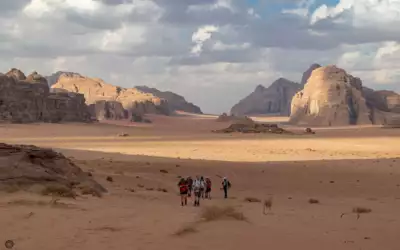
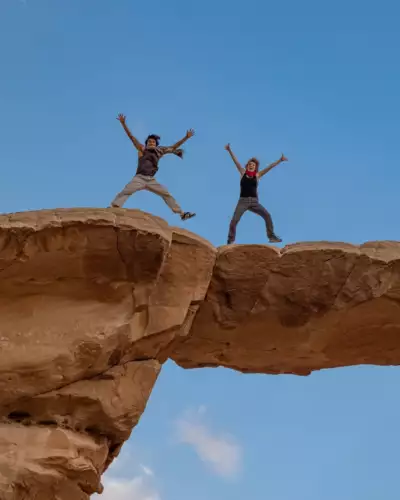
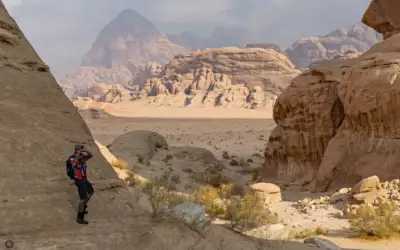
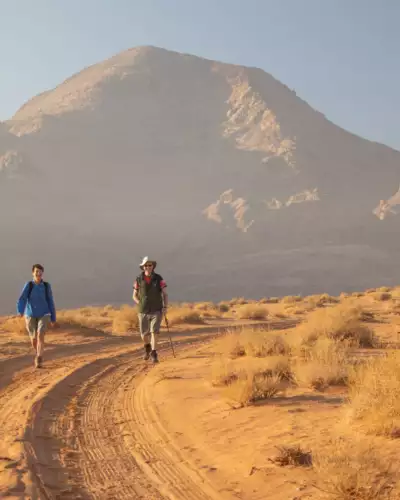
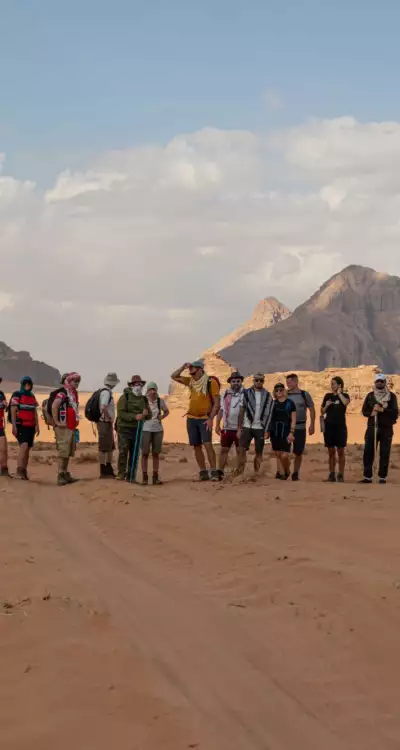
Trip Details
After an early breakfast, we transfer to the Wadi Rum to begin our 50km trek
After an early breakfast, it takes approximately 4 hours to transfer to the Wadi Rum. Our adventure begins as we take to open-topped jeeps, which will take us to a lunch spot, which marks the start of the trek.
15km trek: We begin trekking beyond the Seven Pillars of Wisdom, one of the iconic sights of the Wadi Rum, and head towards the Lawrence House, taking us off the beaten track and through the Jbel mountain area.
We trek through the canyons and Siqs, (Arabic for ‘gateway’), enjoying the impressive landscapes. We will have lunch along the way at the halfway point.
Along our route, we will pass the petroglyphs and inscriptions, which are ancient drawings of humans and animals, thought to be instructions and messages to fellow travellers about the route and hidden springs. We can enjoy a short stop at the famous Um Fruth bridge before heading to our Desert Camp for the night by jeep.
Located deep in a remote canyon, this simple and basic camp is renowned for its warmth and hospitality. Designed to resemble a traditional Bedouin camp, each room has two twin beds and simple en suite facilities.
Accommodation and Meals
Overnight Fixed Desert Camp and full board.
We hop back in the jeeps and start today's trek just beyond where we finished yesterday.
15km trek: Trekking across a vast sandy plain, where herds of camel roam, we reach a steep-sided canyon. We trek through the canyon until we reach an area of violet and purple rocks that look like something from another world.
Here we trek up a short sandy canyon to emerge to a spectacular view across another plain, towards Jordan’s highest mountain, Jabal Umm ad Dami. Reminiscent of Jurassic Park, this is a view you will not forget. Retracing our steps to the main canyon, we carry on trekking down, to reach the end of our trek and a small rock formation which we can climb to view the setting sun.
We jeep back to our camp, wrapping up warm as the sun sets.
Accommodation and Meals
Overnight Fixed Desert Camp and full board.
We start trekking south, through the towering walls of the spectacular Burrah Canyon.
15km Trek: We pass unusual rock formations, including mushroom rock, before trekking down a narrow canyon and emerging to views of a vast plain.
Nestled on the far side is our final destination, the beautiful ‘Candle Camp’. With a large, but easily accessed rock behind it (‘Pride Rock’) we climb for sunset, remembering and never forgetting.
We descend to the Bedouin tent to the warmth of the fire, and where we are introduced to a new form of eating – Mansaf! Tonight, we can enjoy the magical setting of Candle Camp and share stories around the memorising campfire before returning to our camp by jeep, our journey lit by the light of the moon.
Accommodation and Meals
Overnight Fixed Desert Camp and full board.
We leave the desert and progress to the next stage of our journey into the past
After a relaxed breakfast, we say farewell to our desert crew and head to the ancient city of Petra. The journey takes around 90 minutes and we arrive in Petra in time for lunch. We will have the afternoon free to explore Wadi Musa, the village located at the entrance to Petra and to relax at your hotel. We heartily recommend the excellent Museum of Petra, which is located at the Visitors Centre. This explains the evolution of Petra and the Nabatean people, and will greatly aid your understanding of the site when you visit it the next day. We have supper at the hotel.
** There is an option of the summit of Um Ad Dami (1854m), Jordan's highest mountain. We will need to leave very early to ensure we allow enough time. The first part of the ascent is steep and while we need watch our footing on the large boulders, this is not a technical climb and our guides will be there to help you. It takes between 1.5 - 2 hours to reach the summit and we will be rewarded with views across the Wadi Rum and over to the Red Sea and south into Saudi Arabia. After many photo opportunities under the ‘well worn’ Jordanian flag we descend to our jeeps and return to our Desert Camp.**
Accommodation and Meals
Overnight 4* Hotel Petra Guesthouse or similar and full board.
A guided tour of Petra, one of the world's most spectacular archaeological sites, established by the Nabateans over 2,000 years ago.
Petra is one of the highlights of any trip to Jordan and is now a UNESCO World Heritage Site; it is the legacy of the Nabataeans, who dominated the trade routes of ancient Arabia, levying tolls and sheltering caravans laden with Indian spices and silks, African ivory, and animal hides. Petra became widely admired for its refined culture, beautiful architecture and ingenious complex of dams and water channels.
During your visit you will be accompanied by a local guide and be able to explore the hundreds of buildings, facades, tombs, baths, funerary halls and temples. After a late lunch in Petra it is time to visit Aqaba.
Accommodation and Meals
Overnight 4* Movenpick Hotel or similar in Aqaba and full board.
Today we get to know the port city of Aqaba.
You can explore Aqaba’s bustling waterfront, the city’s old town and the local souks where you can find local herbs and spices, essential oils, clothing, and countless other souvenirs. Aqaba, Jordan's only coastal town, has a pleasant year-round climate cooled by a steady northerly breeze. The city's lively atmosphere is complemented by its modern amenities and welcoming hospitality, ensuring a memorable stay for all who visit. We then transfer back to Amman in time for a late supper and a final night celebration.
Accommodation and Meals
Overnight 3* Hotel Madaba and half board (lunch not included)
Trip Details
***There is also a ground only option, i.e. without flights. The price for this option is £1895 and the deposit is still £500***

Trip Details
This is what you will need to buy/source yourself.
It is important that you read the itinerary carefully, and take account of the rating we have given it.
Although our challenges are not technical, they do require a good degree of physical fitness. The conditions will require stamina and strength, which you should recognise and train for. This will be a much better experience if you are fit and prepared. You should feel comfortable walking 6-8 hours per day.
In setting the maximum size of our groups, we take a number of factors into account.
Altitude, degree of difficulty, the terrain, the climate and time of year, all determine the maximum group size. Sometimes it will be 20, sometimes it will be 8-14, but safety is always our priority.
You will be accompanied by a Tribal Tracks UK Leader, Mountain Leader qualified, as well as supported by our local, in-country guides.
It is a requirement of Tribal Tracks booking terms and conditions that each supporter must hold their own travel insurance which covers the trip and the activities they are doing.
We advise you to put insurance in place as soon as possible. Your insurance must be valid and in date, covering the entire period that you are travelling for, including the return journey home. It should cover medical and personal accident risks, and should include repatriation costs and air ambulance or helicopter rescue services, where appropriate. We are happy to help you if you have any queries about this or have any difficulties.
Tribal Tracks has 100% Financial Protection and has a trust account with the Protected Trust Service, member number 5566.
This means that all client monies paid to Tribal Tracks are held in our dedicated trust account, which is supervised by an independent trustee. This means that in the very unlikely event that Tribal Tracks ceases to trade, your money is safe. For more information, please visit this link. Any flights booked for you by Tribal Tracks will be ATOL protected under our own ATOL certificate.
Tribal Tracks considers the safety of all of its participants and staff to be a top priority, and as such we have thorough safety systems in place.
In the event of an injury, we have an evacuation plan in place for all elements of the trek route. We do ask that you look after yourself during the trek in the following way, as this will help avoid unnecessary problems:
We know that the unexpected can happen.
While you are away, things can happen at home and people may need to get in contact with you. This can be tricky when you are in remote areas. So, shortly before departure, we provide you with an Emergency Procedure document to distribute to your nearest and dearest. This sets out how to contact Tribal Tracks and the steps Tribal Tracks will then take to get in contact with you.
It is really important that you are well prepared for your physical challenge and that you are confident that you will be able to fully participate.
Although our leaders are well trained to deal with different capabilities, if they have any concerns about someone’s ability to safely partake in the trek, or their impact on other people’s enjoyment, we authorise them to take necessary action which, in some circumstances, may involve asking someone to step out of the trek. Although this is a very rare occurrence, by booking this trip you agree to section 11 of our Booking Conditions which clearly states that our leaders have the authority to do this. In these circumstances, we will ensure anyone sitting out is safely provided for and offered alternative options where possible. Refunds will not be provided for activities missed and customers may be liable for additional costs incurred.
At Tribal Tracks, Responsible Travel is enormously important to us, and our commitment to responsible travel is evidenced in every itinerary that we prepare.
Core to our business is the belief that holidays can and should be enjoyable to the traveller but should be conducted in a socially, environmentally and economically responsible manner which brings benefit to local communities. This is implemented through a variety of measures which can be found in our Responsible Travel policy - http://www.tribaltracks.co.uk/responsible-travel-policy. We encourage you to read this and to play your own part in travelling responsibly.
Trip Details
Trip Details
The trek is a challenge. We will be walking for a long time over sometimes challenging terrain with steep ascents and descents.
The best way to build endurance fitness is to start with some gentle walks and gradually build up both the distance and duration over the next few months. In the last 2 months, we would recommend to go out and do long days, ideally in the hills, to build up the strength in your legs. About a week before the trek, limit any training to short walks – you want to have fresh legs at the start!
For the trek you should be comfortable trekking between 6 - 8 hours per day, but remember we have all day to achieve the distances and will not be going at racing snake pace. It may sound obvious, but make sure that you are walking properly, hitting the ground with your heel first, then rolling onto your toe, which pushes you onto the next step (this will help reduce the risk of shin splints and tendon pulls). Walk with your head up, eyes forward and shoulders level.
It is a good idea to develop a level of cardiovascular fitness (exercising and strengthening your heart and lungs). This comes from running, cycling or swimming for between 20 minutes and an hour, and will really help develop your endurance fitness. Three sessions a week is normally advised, increasing time and distance over time.
Replicate conditions in training i.e., use all the kit you will be using and try your walking poles if you want to use them.
It is important to pack so that you know where everything is. Separating kit into different packing cubes, or even plastic bags can really help with this. You can pack by item (eg socks and pants in one cube, tops in another etc) or by day, putting your entire outfit for that day together in one place. Taking an extra bag or cube to separate dirty kit is a great idea.
You will have two bags on the trip - your main bag and your back pack.
You should operate on the basis that you will not have access to your main bag during the day and while you are trekking. This means that it is important to have everything you need in your back pack. Waterproofs should go in the bottom, together with an extra layer, sunscreen and sunglasses, plus hat and gloves (if you are in a colder climate). You should also have your water bottles, and any specific snacks, medicines or first aid items you want to take, such as zinc tape and blister plasters. Baby wipes/toilet roll and nappy sacks are also essential for going to the toilet while you are trekking - we will explain more in the pre-departure briefing!
In the event of an injury, we have an evacuation plan in place for all elements of the trek route. We do ask that you look after yourself during the trek in the following way, as this will help avoid unnecessary problems:
We will brief you in the pre-departure briefing as to the catering specifically for your trip. However, as a guide, each morning you will be provided with a very filling local breakfast, usually accompanied by tea or coffee. Lunch will be during your trek and will be prepared by the team of cooks or we will utilise local restaurants or teahouses. Food will always be ample and tasty. If wild camping, dinner will be in the dining tent and will be traditional, freshly prepared food. If you are staying in a hotel or teahouse, dinner will be served there. Water, tea and coffee will be served and alcohol will usually not be available, although there will be some exceptions. We will provide 4 litres of drinking water per person per day. You will need to fill up 2 litres at breakfast and another 2 litres at lunchtime.
Please ensure that you have notified us before departure if you have any specific dietary requirements or allergies as we can cater for most.
Please inform us of any dietary requirements or allergies before you travel, and preferably at the time of booking. We can cater for almost all diets, so please just let us know. We can't cater for you if we don't know what you need!
You will sleep in shared tents (unless a single supplement has been requested). Mattresses are provided, which makes it much more comfortable! There will be a central dining tent available with rugs and lights where the group can get together in the evening, share stories and enjoy meals. There will also be an open fire wherever it is possible.
Sleeping bags are designed to work by trapping your body heat in the down surrounding you. If you wear lots of layers, your body heat will not be able to escape as effectively, and you will be cold. Wearing a thin thermal layer is ideal. It does sound counter intuitive, but we promise that it works!
Putting your clothes for the next day in the bottom of your sleeping bag will also help with warmth, as it will fill up any spare space around your feet, and it will mean your clothes are nicely warmed up in the morning.
If you find it difficult to sleep without a pillow, we recommend that you take a travel pillow and a regular pillowcase with you. Put your pillow in the pillow case, and use your down jacket/layers to fill out the pillowcase, you will end up with a pretty decent pillow!
And as for stuff or roll when it comes to packing your bag away? We are very much in the stuff camp!
There will be early morning starts, typically around 0600 - 0700hrs, so that the team can set off on the trek in good time. It is important that you pack up your kit before breakfast and leave your bag outside your tent or accommodation so that the crew can load them onto the jeeps and/or mules. There will be a freshly cooked lunch provided on your trek route. The aim is to get into camp before sunset if possible, when you can enjoy a hot drink and snacks. It is important that you change into your thermals and put layers on when you get into camp as the temperatures can drop sharply and you need to keep warm.
In the morning, the Tribal Tracks leader will wake up the group. When you hear the call, please begin to get ready, and pack all your kit away in your 'main bag' before breakfast. Put this bag outside your tent or accommodation as the crew can then begin to break down the tents/load the luggage. Ensure that you have all that you need in your backpack for the day, as you will not have access to your main bag until the next camp (see 'What do I put in my backpack?).
When you arrive into camp, it is important to get changed into different clothes, usually the ones that you will be wearing the next day. Even if you have had dry weather, you will have been sweating, and your clothes will be damp. As the sun sets and the air cools, you will quickly feel cold. Before this, you will want to freshen up and we recommend the 'baby wipe bath'. As there are no showers while on the trek, having a freshen up with a baby wipe will help keep you clean and will make you feel much better, before you put your clean clothes on. Unpack your sleeping bag and get everything out that you need for nighttime, such as your warm hat, jacket, head torch and book. Sort out your back pack for the next day by removing rubbish and replenishing snacks etc.
Doing this before dinner will mean you can get into your sleeping bag quickly, when it is likely to feel cold.
There will be a toilet tent and water supplied for washing in the morning where we can. There are no shower facilities provided during the trek and there will be no toilets either, but there will be a toilet tent in camp in the evenings and mornings. In the pre-departure briefing, we will tell you all that you need to know about how to deal with this.
For up-to-date vaccinations information please visit the NHS website ‘Fit for Travel’ at: http://www.fitfortravel.nhs.uk. The Tribal Tracks team are travel professionals, but we are not medical experts, and we would encourage you to visit your GP or travel nurse to discuss vaccination requirements. Please remember to take your itinerary with you so that they can see where you will be travelling. You should make an appointment at least 3-4 months before you travel.
In addition, please note that information on vaccinations can change at short notice; we recommend that you contact your Medical Professional or a Travel Health Clinic at least 8 weeks prior to departure for the most up to date information.
We recommend that you bring a multi-region adapter plug with you. There will be no facility to recharge electrical items on the trek, so we recommend you bring a power bank to top up the charge. We also recommend putting your phone on Airplane mode during the day to save on power.
Using your mobile overseas can sometimes attract unwelcome, very high tariffs. We recommend that you check with your network provider before you travel, but if in doubt, keep your phone switched to Airplane mode and use it only when there is WiFi. Reception can also be patchy, and unreliable, particularly in remote areas, which is why we carry a satellite phone with us. Please let your nearest and dearest know about this, and warn them that you may not be able to be in regular contact.
We ask that your luggage is kept to the absolute minimum. We will tell you the weights that you should not exceed, but usually, your main bag should not exceed 23kgs in weight.
It is important that you wear, or take your trekking boots with you in your hand luggage on the flight, as they are vital for the trek and cannot be replaced in the event of lost luggage.
We recommend leaving behind items such as high value jewellery, watches etc. Your passport and money should be always kept on you.
Trip Details
It is possible to extend your stay, either to relax in Aqaba, or to visit Petra, one of the seven wonders of the world. Please just let us know and we can tailor the trip to your requirements.
Let’s get you on the right track!